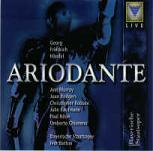This raucously recorded Ariodante is very exciting. Taped live in Munich in January, 2000, it has the whiff of theater about it, and conductor Ivor Bolton leads his non-period instrument orchestra with real panache. I doubt that even purists will feel that he’s doing any disservice to the music. The cast delivers its recitatives not only quickly and naturally, but in this hot-tempered tale they spit out their angrier words and bend and stretch the rhythms to make dramatic points. I’ve reviewed two other performances of this opera on Classicstoday.com: a rather stuffy one from Raymond Leppard with a wonderful Janet Baker, and Marc Minkowski’s unleashed reading with Anne Sofie von Otter and Ewa Podles–the latter as Polinesso, a male role originally sung by a woman, taken by a countertenor for Leppard and also here, in this new, Bolton-led recording.
But listening to this performance is quite an experience. Bolton’s quick tempos occasionally menace the singers–how the remarkable Ann Murray gets through “Con l’ali di costanza”, with its maniacal divisions and low-reaching coloratura, with such style and without sounding absolutely crazy is a miracle. In fact, Murray is the most vivid Ariodante on disc–and she’s in good company: aside from Baker and Otter, Lorraine Hunt sings the role for Nicholas McGegan. Her voice is neither the most opulent nor the most beautiful, but she’s so thoroughly “in” the character that she sweeps us along. The same might be said for Christopher Robson’s nasty Polinesso. Unafraid of either the music or of making unappealing sounds, countertenor Robson is a super-villain in the best mustache-twirling tradition. Joan Rodgers’ Ginevra is lovely and innocent, the bright “ping” of her voice is engaging, and her mad scene is very credible. Julie Kaufmann’s Dalinda is properly weak and confused and then remorseful, and she makes much of the text. Tenor Paul Nilon’s Lurcanio (Ariodante’s brother) is quite good, but Richard Croft for Minkowski is better. Umberto Chiummo’s King is resonant.
There are two overall problems with this set. The sound is too bright and tends to overload, and this makes for a general shrillness that tires the ear. And Bolton’s exciting leadership, coupled with his cast’s free way with embellishments, occasionally makes this a sloppy affair, with wild notes and wacky pit/stage relationships. The audience rarely intrudes and I can’t figure out why it opts to applaud when it does and to keep still at other, more obvious times. Perhaps part of this set was taken from rehearsals? And so, this is a mixed bag–a truly good showing of one of Handel’s greatest works, albeit without the meticulousness both Minkowski and McGegan bring to their readings. I find it too exciting to disregard, and you might feel the same way.
































